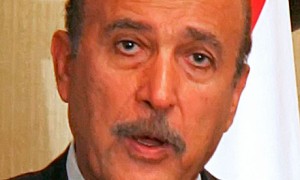 Reports Friday that Egypt’s President Hosni Mubarak has stepped down indicate he has handed over power to the armed forces and left Cairo for a resort in Sharm-al-Sheikh. The military issued a statement saying it would lift a thirty-year-old emergency law “as soon as current circumstances end” and pledged to “holding free and fair elections in light of the constitutional amendments.”
Reports Friday that Egypt’s President Hosni Mubarak has stepped down indicate he has handed over power to the armed forces and left Cairo for a resort in Sharm-al-Sheikh. The military issued a statement saying it would lift a thirty-year-old emergency law “as soon as current circumstances end” and pledged to “holding free and fair elections in light of the constitutional amendments.”
Mubarak’s exit was surrounded in confusion, largely because of a speech he delivered on February 10, in which he promised to delegate some of his presidential powers to Vice President Omar Suleiman but said he will stay on during the transition to a new government following September elections. Egypt’s ambassador to the United States, Sameh Shoukry, rushed to do damage control. “Maybe there was a confusion related to the extent to which the president has transferred power. He referred to some power, but it is categorical that the president has transferred all power,” he told NPR.
 But some experts question the latest turn of events and the military’s role going forward. Ellis Goldberg, a professor of political science at the American University in Cairo, writes in Foreign Affairs that “the real concern is that the regime will only shed its corrupt civilians, leaving its military component as the only player left standing.” This, he says, would likely result in “the culmination of the slow-motion coup and the return of the somewhat austere military authoritarianism of decades past.” Stratfor analysis argues a military takeover could parallel the events of 1952, when the Free Officers Movement led by Gamal Abdel Nasser, later president of Egypt, overthrew the monarchy. Egypt’s presidents since then have all come from the military.
But some experts question the latest turn of events and the military’s role going forward. Ellis Goldberg, a professor of political science at the American University in Cairo, writes in Foreign Affairs that “the real concern is that the regime will only shed its corrupt civilians, leaving its military component as the only player left standing.” This, he says, would likely result in “the culmination of the slow-motion coup and the return of the somewhat austere military authoritarianism of decades past.” Stratfor analysis argues a military takeover could parallel the events of 1952, when the Free Officers Movement led by Gamal Abdel Nasser, later president of Egypt, overthrew the monarchy. Egypt’s presidents since then have all come from the military.
While the army has tried to present itself as a neutral force so far in the protests, it has also been “calling the shots” during the arrests and intimidation that have accompanied the protests, writes Daniel Williams of Human Rights Watch. One outcome for Egypt’s future, he says, could be “Mubarak-ism without Mubarak (LAT), with military overseers preserving the old system under a new guise.” Others warn of the dangers of a transitional period in which the army is unable to protect its citizens (NYT), as was the case in Indonesia in 1998.
If the power of the army causes some concern, the possible rise of the Islamist Muslim Brotherhood generates other fears. Critics like CFR’s Leslie H. Gelb say the Muslim Brotherhood could be “calamitous” for U.S. security. Others, including CFR’s Ed Husain, argue that “the Brotherhood in Egypt are open to being shaped by partners, critics, and political reality.”
A change in Egypt’s government has also raised regional fears. In Iran, Egypt’s unrest has stoked tensions between hardliners and the opposition movement. Israel is fearful that the fall of Mubarak, who maintained the cold peace forged between between the two countries by President Anwar Sadat, could mean the rise of “a new Iran” across the border, as Aluf Benn writes in Foreign Affairs.
For now, CFR President Richard Haass says Egypt’s deep challenges remain: “We’re still talking about a political transition,” he told a February 10 CFR media conference call. “Basic questions of pace, sequencing, legal questions, political questions are all out there. The economic challenges as a result of today will, if anything, probably grow slightly greater.”
Washington will have to navigate a tricky course between backing democracy and protecting its interests in the region. “The end of Hosni Mubarak’s regime in Egypt portends fundamental change throughout the Middle East and the end of the American era in the region,” writes CFR’s Steven Cook.
Analysis:
Robert Scheer writes the Obama administration is supporting “the sordid option of backing a new and improved dictatorship (HuffingtonPost)” by accepting Vice President Omar Suleiman as Mubarak’s replacement.
CFR’s Elliott Abrams says in ForeignPolicy.com that it’s time for the United States “to bury the unreal, failed ‘realism’ of those who have long thought that dictators brought stability. What we have seen is that the stability they bring–for years or even decades–carries with it a curse.”
The Nation discusses the “uncomfortable truths about U.S. foreign policy” revealed by uprisings in the Middle East.
Analyst David Rothkopf, in Foreign Policy.com notes Obama administration’s missteps on Egypt and says U.S. diplomacy on Egypt “must involve a kind of patience and perspective the White House seems to have lost touch with in the past few days.” cfr

Leave a Reply
You must be logged in to post a comment.